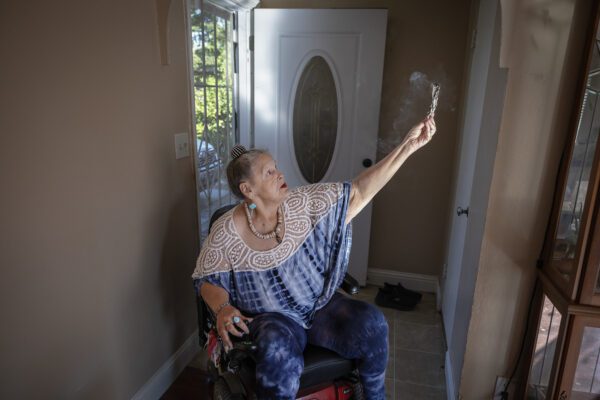



After California legalized medical marijuana in 1996 and then recreational cannabis a decade later, one might think that for many patients, the state would be a sanctuary for seeking treatment.
But as CalMatters’ state Capitol reporter Alexei Koseff explains, those who rely on cannabis to treat pain, seizures, glaucoma and other ailments say that despite helping pave the path toward legalization, they are the ones being left behind.
This is the latest extensive story Alexei has done on cannabis in California:
- The legal cannabis industry’s plea for Gov. Gavin Newsom to cut cannabis taxes.
- Cannabis companies courting voters, not local officials, to approve local dispensaries.
- And the collapse of the Emerald Triangle, which once dominated the state’s cannabis production and the resulting struggles for cannabis growers and workers.
Under Proposition 215, passed in 1996, patients were able to secure cannabis through legal collectives, where they could pool their resources and pay “caregivers” to grow medicine. But after voters approved Proposition 64 in 2016, which green-lit a commercial cannabis market, California transitioned to a new regulatory framework that required collectives to become licensed, similar to commercial dispensaries. Because the process is expensive and complex, many collectives dissolved within the last five years.
- Bonnie Metcalf, a 61-year-old Sacramento County resident who uses cannabis to treat her sarcoidosis: “The system that exists is bulls–t. These rich people are paying more for packaging and branding than they are worried about medicine for people. They don’t care. It’s not a medicine to them. It’s just another money-making scheme like beer or cigarettes.”
But commercial dispensaries are also scarce — they’re still prohibited in more than 60% of cities and counties in California. And few dispensaries participate in programs that allow them to donate medical marijuana to patients who cannot afford it.
One more thing to keep in mind: Most health insurance plans do not cover medical marijuana because it’s still outlawed federally. And as access to legal medical marijuana becomes more arduous — especially for patients who are older, have low-income or are suffering from chronic conditions and need large amounts for treatment — getting cannabis through illicit means becomes the alternative.
- Bette Braden, who runs unlicensed cannabis pop-ups in the Sacramento area: “The laws are so hideous. I used to be an activist. Now I’ve gone over to the underground.”



